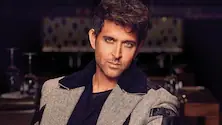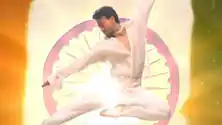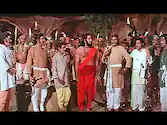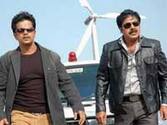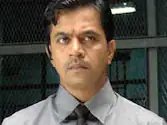By:
Screen
Weekly,
IndiaFM
Monday,
October
16,
2006
He
has
given
a
new
angle
to
'Vande
Mataram...
'
with
the
Lage
Raho
Munnabhai
version
'Bande
mein
tha
dum,
Vande
Mataram...'.
And
if
he
has
treaded
tapori
terrain
with
'Bolo
to
bolo
woh
kaisi
hogi
haaye...'
he
has
also
written
the
plaintive
'Bigdi
banaa
de
Santoshi
Maata...
'
for
Jai
Santoshi
Maa.
In
2005,
he
explored
a
range
from
'Kaisi
paheli
zindagani...'
to
'Piyu
bole...'
in
Parineeta
and
a
year
earlier
wrote
the
in-depth
poetry
of
Hazaaron
Khwaishein
Aisi.
Meet
Swanand
Kirkire,
the
man
who
cannot
compromise
his
quality
for
quantity
and
substance
for
commerce.
He
represents
the
small
but
significant
segment
of
the
new
breed
of
lyricists
from
whom
we
can
expect
depth
and
content
along
with
technique
-
because
it's
their
choice.
Excerpts.
What
has
changed
after
a
pathbreaking
mega-hit
like
Lage
Raho
Munnabhai?
I
think
that
Parineeta
gave
me
a
good
standing
last
year,
but
Lage
Raho
Munnabhai
has
underlined
it.
Before
this
there
was
Hazaaron
Khwaishein
Aisi.
So
now
people
have
realized
that
I
have
the
capacity
to
write
a
variety
of
songs
rather
than
just
one
or
two
kinds
and
you
cannot
stereotype
me..
You
are
really
the
first
Marathi
lyricist
to
succeed
in
Hindi
cinema.
Maharashtrians
have
been
giants
in
every
aspect
of
Hindi
films
other
than
dialogues
and
lyrics.
How
does
it
feel,
and
to
what
do
you
credit
this
unique
feat?
It
feels
great.
I
was
born
and
brought
up
in
Indore
in
Madhya
Pradesh,
and
my
medium
of
education
was
Marathi.
But
I
joined
the
National
School
Of
Drama
in
New
Delhi
to
learn
Design
and
Direction.
I
learnt
a
lot
of
aspects
like
costumes
and
lighting
with
respect
to
the
stage
though
I
always
knew
that
I
was
going
to
write
and
come
down
to
Mumbai.
I
was
also
interested
in
poetry
so
lyrics
was
almost
like
a
corollary.
I
also
began
to
translate
plays
and
once
I
wrote
a
song
that
everyone
liked.All
these
factors
helped
me
to
develop
my
Hindi,
like
my
surroundings
at
NSD.
I
have
also
read
all
the
great
Hindi
poets.
Have
Hindi
film
songs
been
a
part
of
that
study?
Hundred
per
cent!
My
father
was
a
great
follower
of
film
music
and
would
draw
my
attention
to
the
poetic
richness
of
so
many
songs.
My
father
had
a
sense
of
'metering'
that
he
would
point
out
to
me.
His
favourites,
and
therefore
mine
as
well,
were
Shailendra,
Sahir
Ludhianvi
and
Majrooh
Sultanpuri.
Slowly
I
began
to
unconsciously
analyze
these
songs
and
began
to
understand
that
film
lyrics
had
to
be
about
poetry
as
well
as
about
the
lingo
needed
for
the
character
and
the
craft
element.
I
realized
that
good
lyrics
will
always
have
metaphors
and
images,
and
when
there
has
to
be
philosophy,
it
should
be
in
the
common
man's
language.
Was
Hazaaron
Khwaishein
Aisi
your
first
as
a
lyricist?
Yes,
Sudhirji
heard
my
poetry
and
suggested
that
I
write
the
songs.
How
did
Sudhir
and
you
get
together?
You
will
find
it
interesting
to
know
that
I
came
to
Mumbai
to
become
a
director
rather
than
to
write!
I
assisted
Manju
Singh
on
her
TV
serial
Swaraj.
Then
I
joined
Sudhir
Mishra
and
assisted
him
on
three
films,
Calcutta
Mail,
Hazaaron...
and
Chameli
for
which
I
was
the
Associate
Director
and
also
wrote
the
dialogues.
And
then
you
sang
a
song
in
Hazaaron
Khwaishein
Aisi
too.
Yes.
My
father
and
mother
have
both
been
disciples
of
Kumar
Gandharva
and
so
I
unconsciously
developed
the
hang
of
words
and
music.
I
gradually
imbibed
the
relationship
between
words
and
music
in
both
Hindi
and
Marathi
and
this
is
what
first
got
me
interested
in
the
performing
arts.
I
sang
the
Bhojpuri
folk
song
'O
sajni
re...'
on
location
and
Sudhir-ji
heard
it
and
made
Shantanu
Moitra
listen
to
me.
It
was
then
that
they
made
me
sing
'Bawra
man...'
in
HKA.
Later
I
sang
'Raat
akeli
to...'
in
Parineeta
too.
Except
for
Sehar
which
had
music
by
Daniel
B.George
who
arranges
for
Shantanu,
you
have
only
worked
with
the
latter
before
Jai
Santoshi
Maa
with
Anu
Malik.
Have
you
planned
to
restrict
your
work
to
Shantanu
and
keep
others
as
exceptions?
No,
there
is
no
restriction
like
that.
The
impression
has
been
created
because
Shantanu
and
I
have
grown
together
with
these
three
films.
We
got
together
with
HKA
and
one
thing
led
to
another.
I
have
had
interactions
with
some
other
composers
and
I
am
in
touch
with
them.
I
am
also
working
with
Pritam
in
Saurabh
Shukla's
film.
How
was
the
Jai
Santoshi
Maa
experience?
Frankly
I
was
not
very
comfortable
with
the
idea
of
writing
devotionals,
simply
because
I
am
inclined
towards
the
rational
and
a
Left-like
approach
to
life.
Till
now,
I
have
probably
written
every
kind
of
poetry
or
lyrics
but
not
the
bhajan.
But
then
I
thought
that
I
should
try
my
hand
at
them
too.
I
am
quite
satisfied
with
my
work
though
I
do
not
claim
that
I
have
done
anything
exceptional.
I
also
enjoyed
working
with
Anu
Malikji
who
was
extremely
easy
at
work.
How
do
you
look
at
what's
happening
in
lyrics
today?
I
think
that
there
are
some
lyricists
who
are
doing
good
work,
and
can
do
better
in
the
right
environs.
Yes,
the
kind
of
language
we
use
in
a
song
has
changed,
but
the
thoughts
remain
the
same,
which
is
again
a
bit
of
a
problem
because
there
has
to
be
some
new
element
every
time.
For
example,
if
I
write
a
romantic
song
then
it
must
tell
you
something
more
than
just
about
love.
Then
again
every
listener
has
his
own
relationship
with
a
song.
To
come
full
circle,
some
songs
in
Lage
Raho
Munnabhai
have
joint
credits,
like
'Bande
mein
tha
dum...'
.
Yes,
because
when
we
used
to
brainstorm,
suggestions
would
come
up.
For
example,
it
was
Vinod
(Chopra)ji
who
suggested
the
words
'Bande
mein
tha
dum...'
when
I
thought
that
it
would
be
a
good
idea
to
use
the
words
'Vande
Mataram..'
in
a
song.
Farhad
had
also
contributed
the
tapori
part
of
the
lyrics
in,
just
the
way
he
had
done
in
Munnabhai
MBBS.




 Click it and Unblock the Notifications
Click it and Unblock the Notifications




